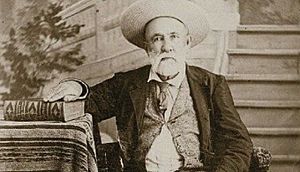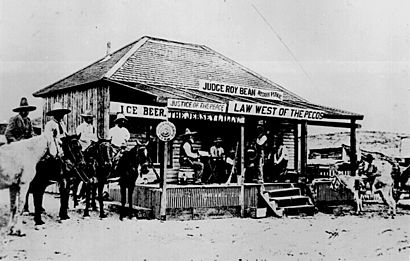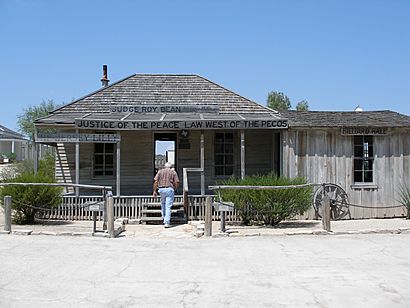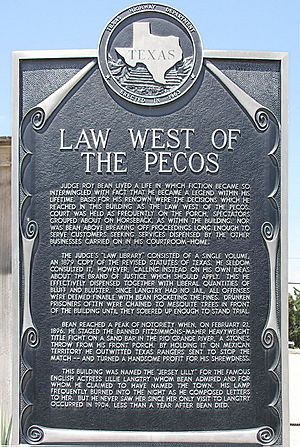Roy Bean facts for kids
Quick facts for kids
Judge Roy Bean
|
|
|---|---|
 |
|
| Born |
Phantly Roy Bean Jr.
1825 Mason County, Kentucky, U.S.
|
| Died | March 16, 1903 (aged 77–78) Langtry, Texas, U.S.
|
| Burial place | Whitehead Memorial Museum Del Rio, Texas |
| Other names | "Only Law West of the Pecos" |
| Occupation | Justice of the Peace/Coroner/Notary Public Saloon keeper |
| Years active | 1882–1903 |
| Spouse(s) | Virginia Chavez (divorced) |
| Children | 4 |
| Relatives | Joshua Bean |
Phantly Roy Bean Jr. (c. 1825 – March 16, 1903) was an American saloon-keeper and Justice of the Peace in Val Verde County, Texas, who called himself "The Only Law West of the Pecos". According to legend, he held court in his saloon along the Rio Grande on a desolate stretch of the Chihuahuan Desert of southwest Texas. After his death, fictional Western films and books cast him as a hanging judge, although he is known to have sentenced only two men to hang, one of whom escaped.
Early life
Roy Bean was born circa 1825 in Mason County, Kentucky, and was the youngest of five children (four sons and a daughter) of Phantly Roy Bean Sr. (November 21, 1804 – June 13, 1844) and the former Anna Henderson Gore. The family was extremely poor and at age sixteen Bean left home to ride a flatboat to New Orleans, hoping to find work. After getting into trouble in New Orleans, Bean fled to San Antonio, Texas, to join his elder brother Sam. Samuel Gore "Sam" Bean (1819–1903), who had earlier migrated to Independence, Missouri, was a teamster and bullwhacker. He hauled freight to Santa Fe and then on to Chihuahua, Mexico. After Sam fought in the Mexican–American War, he moved out of San Antonio, where his brother Roy joined him. In 1848 the two brothers opened a trading post in the Mexican state of Chihuahua. By the spring of 1849, Roy Bean had moved to San Diego, California, to live with his elder brother Joshua Bean, who would be elected the first mayor of San Diego the following year.
Later, Bean chose to leave California and migrated to New Mexico to live with Sam, who had been elected the first sheriff of Doña Ana County. In 1861 Samuel G. and Roy Bean operated a store and saloon on Main Street in Pinos Altos (just north of Silver City) in present-day Grant County, New Mexico. It advertised liquor and "a fine billiard table". A cannon belonging to Roy Bean sat in front of the store for show and had been used to repel an Apache assault on the town.
Move to Texas
During the Civil War, the Confederate Army had invaded New Mexico. During the Battle of Glorieta Pass in March 1862, the Confederates lost their supply wagons and were forced to retreat to San Antonio. After taking money from his brother's safe, Bean joined the retreating army. For the remainder of the war, he ran the naval blockade by hauling cotton from San Antonio to British ships off the coast at Matamoros and returning with needed supplies. For the next twenty years, Bean lived in San Antonio, working nominally as a teamster. During this time he attempted to run a firewood business by cutting down a neighbor's timber. He then tried to run a dairy business but was soon caught watering down the milk. Bean later worked as a butcher, rustling unbranded cattle from other area ranchers for his business.
On October 28, 1866, he married eighteen-year-old Virginia Chavez. Within a year after being married, he was arrested for aggravated assault and threatening his wife's life. Despite the tumultuous marriage, they had four children together: Roy Jr., Laura, Zulema and Sam. The family lived in what was described as "a poverty-stricken Mexican slum area called Beanville". Beanville would have been centered near the present-day corner of South Flores Street and Glenn Avenue not far from Burbank High School. By the late 1870s Bean was operating a saloon in Beanville and had heard that many construction camps were opening as several railroad companies were working to extend the railroads west. A store owner in Beanville "was so anxious to have this unscrupulous character out of the neighborhood" that she bought all of Bean's possessions for $900 so that he could leave San Antonio. At the time, Bean and his wife were separated and he had left his children with friends as he prepared to go west.
Justice of the peace
With the money he received, Bean purchased a tent, some supplies to sell, and ten 55-gallon barrels of whiskey. By the spring of 1882, he had established a small saloon near the Pecos River in a tent city he named Vinegaroon. Within 20 miles (32 km) of the tent city were 8,000 railroad workers. The nearest court was 120 miles (190 km) away at Fort Stockton, and there were few means to stop illegal activity. A Texas Ranger requested that a local law jurisdiction be set up in Vinegaroon, and on August 2, 1882 Bean was appointed justice of the peace for the new Precinct 6 in Pecos County. His first case, however, was heard earlier, on 25 July 1882, when Texas Rangers brought in Joe Bell to be tried.
Bean then turned his tent saloon into a part-time courtroom and began calling himself the "Only Law West of the Pecos." As a judge, Bean relied on a single law book, the 1879 edition of the Revised Statutes of Texas, and when newer law books showed up he used them as kindling. Bean did not allow hung juries or appeals. Jurors, who were chosen from his best bar customers, were expected to buy a drink during every court recess. He was also known for his unusual rulings.
By December 1882, railroad construction had moved farther westward and Bean moved his courtroom and saloon 70 miles (110 km) to Strawbridge (now Sanderson). He sent for his children, who then lived with him at the saloon, with his youngest son Sam sleeping on a pool table. A competitor who was already established in the area laced Bean's whiskey with kerosene. Unable to attract customers, Bean left the area and moved to Eagle's Nest, 20 miles (32 km) west of the Pecos River, which was soon renamed Langtry.
The original owner of the land, who ran a saloon, had sold 640 acres (2.59 km2) to the railroad on the condition that no part of the land could be sold or leased to Bean. O'Rourke, the Irishman whose case Bean had previously dismissed, told Bean to use the railroad right-of-way, which was not covered by the contract, and for the next 20 years Bean squatted on land he had no legal right to use. Bean named his new saloon The Jersey Lilly in honor of Lillie Langtry, who recounted in her autobiography that she had visited the area after Bean's death. She did, however, send to Bean a pair of Colt .45 pistols. Langtry did not have a jail – although it is reported that outside The Jersey Lilly was a large oak tree with a heavy log chain that served as a "jail" for those unable to pay their fines; all cases were settled by fines. Bean refused to send the state any part of the fines, and kept all of the money. In most cases the fines were made for the exact amount the accused person was carrying.
Later years and death
In 1890, Bean received word that railroad developer and speculator Jay Gould was planning to pass through Langtry on a special train. Bean flagged down the train using a danger signal. Thinking the bridge was out, the train engineer stopped the train. Bean then invited Gould and his daughter to visit the saloon as his guests. The Goulds visited for two hours, causing a brief panic on the New York Stock Exchange when it was reported that Gould had been killed in a train crash.
In 1896, Bean organized a world championship boxing title bout between Bob Fitzsimmons and Peter Maher on an island in the Rio Grande because boxing matches were illegal in both Texas and Mexico. The fight, won by Fitzsimmons, lasted only 1 minute and 35 seconds, but the resulting sport reports spread Bean's fame throughout the United States.
As he aged, Bean spent much of his profits helping the poor of the area and always made sure that the local schoolhouse had free firewood in the winter. In January 1901 Bean stated that a claim for damages of $13,000 from Apache depredations of his mules would certainly be allowed.
Bean died peacefully in his bed on March 16, 1903 in San Antonio. He and his son, Sam Bean (1874–1907), are interred at the Whitehead Memorial Museum in Del Rio. In 1965, as part of the Civil War Centennial commemoration in Texas, an official Texas Historical Marker honoring Bean was erected on the museum grounds in Del Rio, Texas.
See also
 In Spanish: Roy Bean para niños
In Spanish: Roy Bean para niños




